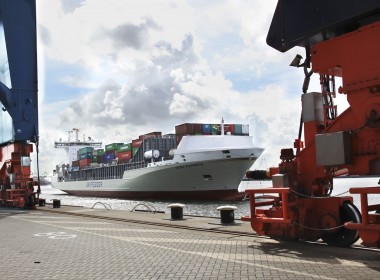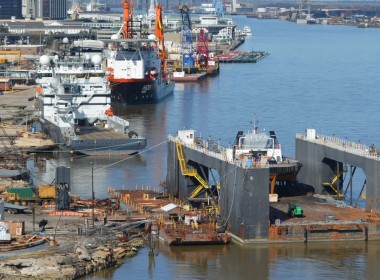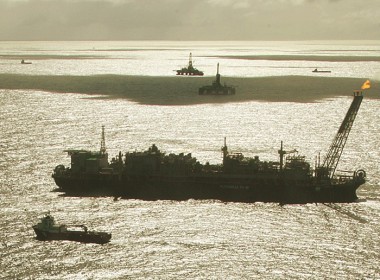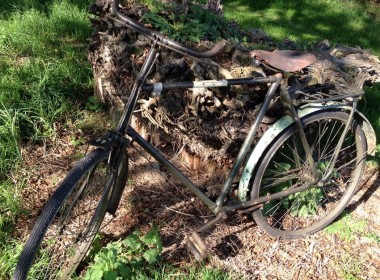REMINISCENCES | The lessons of “Supership” half a century on

Fifty years ago, the shipping “establishment” was plunged into angst and indignation by the publication of a book that opened up many of the mysteries of the modern maritime industry to critical public scrutiny.
Noel Mostert’s “Supership” was the account of a voyage he had taken from North Europe to the Arabian Gulf aboard the 214,085DWT P&O very large crude carrier (VLCC) Ardshiel. The author, the very best sort of journalist, took a close look at contemporary shipping, then in the midst of an era of extraordinary change, and its effects upon its personnel afloat and ashore.
He was writing for a readership that retained certain pre-conceived memories of shipping and its importance to the developed world, but he reported on some of the worrying developments that the sheer scale of industrial shipping was inflicting upon both safety and the marine environment. The huge ships that were suddenly being extruded from shipyards represented a massive step change from their predecessors, with a sort of blind faith that appeared to be simply extrapolating old notions of engineering and seamanship, safety, and emergency response and assuming all would be able to adjust.
The book was written against a background of a Suez Canal closure, which acted as a spur for giant ship construction, and a growing public disquiet about the safety of these monsters and their cargoes. It was but a few years since the loss of the Suezmax oil tanker Torrey Canyon had ushered in the age of the “super-spill”, with the intervening years punctuated by several spectacular tank explosions aboard some of the world’s biggest ships, along with various breakdowns and strandings.
“While managements were huffing and puffing, seafarers who took the trouble to read the book were lavish with their praise.”
The public, while still sensible enough to recognise its reliance upon hydrocarbons, was losing what tolerance it had to oiled beaches from tank washings with its attendant mortality among sea birds. Mostert’s fine book – in which the description of his voyage was written against a well-researched view of ship construction and development, oil politics and the capacity of the ocean to cope with these new challenges – undoubtedly provoked even more disquiet
The over-arching question that he posed was whether those who regulated and ran this new generation of giant ships really knew what they were doing.
The book was entirely topical in the climate of those times, very well received and extensively read. The oil company and shipping establishment was not so impressed, being unused to such external forensics about its operations.
The owners of Ardshiel were heavily criticised by the good and great for opening their practices to a journalist and facilitating the publication of such a volume. P&O, mere newcomers to the tanker trades – what do they really know about oil tanker operations? It was made clear that wiser owners would not have let such a person into the oil terminal gates, let alone permitting him to mount the gangway.
Yet while managements were huffing and puffing, seafarers who took the trouble to read the book were lavish with their praise, commending the frankness and clarity with which the author expressed concerns that they felt but were unlikely to have been free to enunciate while remaining in employment.
“If you can get hold of a copy, just to compare it with the contemporary maritime world is both enlightening and entertaining, although sometimes a little depressing.”
Hailing from South Africa, whose coastline was already being menaced by giant ships going around the Cape and being disabled by engine trouble or smashed up by heavy weather, Mostert relayed the worries about whether it was wise to operate a 200,000DWT ship with a single boiler and almost no equipment redundancy. He suggested that there was a new attitude to risk under the latest dispensation, with these single-skinned oil tankers being so large that no human crew aboard them (and there were more than twice those of today) could possibly intervene effectively in any sort of emergency.
Where were the tugs that might keep these dead monsters off a lee shore? He asked questions about the role of insurance and whether insurers really understood what they were doing with the risks they were writing.
It is one of the finest books ever written about modern shipping and seafaring. It is also prophetic in many ways, as he writes about the way in which the cheap and cheerless, the rise of the flags of convenience, the end of the traditional registers could, by the early 1970s, already be forecast.
It is a classic of sea writing that I professionally return to once a decade, just to see how his ideas had worked out. I last “reviewed” it twenty years ago, some years after his death, but there is such a lot Mostert wrote about that remains relevant today. It is, in its way, a classic, and probably informed more modern authors such as Rose George or Horatio Clare.
He would have been delighted with the way in which the tanker sector eventually became the Rolls-Royce of global shipping standards. He would have probably been unsurprised at the long years of bulk carrier tragedies in the 80s and 90s.
He would, one might suggest, have been appalled at the way in which the “dark” tanker fleet has most recently been permitted to reverse so much progress. He might be concerned at a reversion to the Cape route, with the Red Sea hostilities and potential safety impacts. He would have been astonished at the disappearance of so much of the developed nations’ seafaring workforce and its replacement from those nations able to do the job more economically.
It would have been good to have had his trenchant views on modern technology, the present-day IMO and the prospect of ships with nobody on them at all!
“Supership” is long out of print, but if you can get hold of a copy, just to compare it with the contemporary maritime world is both enlightening and entertaining, although sometimes a little depressing.
Submissions wanted! Do you have an exciting, amusing, or downright dangerous anecdote from your time in the maritime world? Send your submissions to [email protected].







